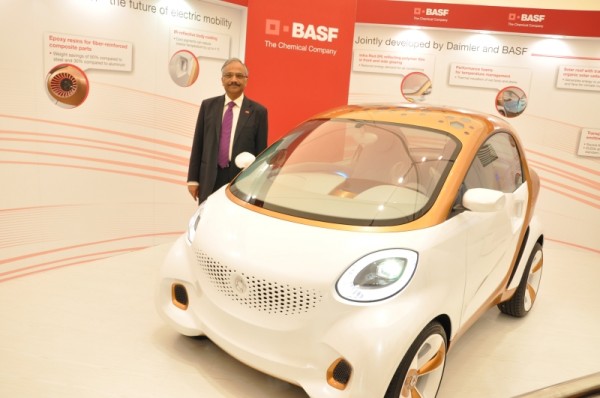Taking electric mobility to the next level, BASF, the world’s leading chemical company, unveiled the ‘smart forvision’, a concept car at the Indo-German URBAN MELA in Delhi coinciding with its theme of Sustainable Urbanisation.
Jointly developed by BASF and Daimler, it combines futuristic design with innovative technologies in the areas of energy efficiency, lightweight design and temperature management. The smart forvision is the perfect vehicle for showcasing new technologies.
Through Daimler’s automotive expertise and BASF’s material and system competence a vehicle has been created which showcases technologies for sustainable and holistic electric mobility of the future. The researchers and designers intentionally realised a mixture of visionary materials and technologies in the concept vehicle – some of these are still at a laboratory stage while others have a realistic chance of entering series production. Smart forvision was first showcased at the 2011 International Motor Show in Frankfurt.
BASF, the world’s largest supplier of chemical products to the automotive industry, develops sustainable, environmentally friendly solutions for the energy-efficient mobility of tomorrow. The two companies combined their technological competencies for the first time, developing a forward-looking vehicle concept that offers decisive solutions to the challenges of the future.
Transparent organic solar cells, transparent organic light-emitting diodes, all-plastic wheels, new lightweight body components and infrared-reflective films and coatings all help to reduce the vehicle’s energy consumption and so increase its range and practicality.
Energy efficiency
State-of-the-art materials and technologies allow new concepts to be implemented in the electric car that not only save energy, but even generate it. The resulting increase in range contributes to further improving the performance and economy of electric vehicles. The smart forvision features energy-efficient solutions such as power-generating solar cells based on organic-chemical dyes on the roof. Combined together with energy-saving organic light-emitting diodes (OLEDs), the vehicle’s roof, which is covered in solar cells, is not just environmentally friendly, but a real design highlight as well.
Multifunctional lightweight design
The lighter an electric vehicle is, the less drive energy it requires, and the greater its range will be. Making vehicles lighter will therefore be one of the key challenges for electric mobility in the future, and BASF can make an important contribution here. Lightweight design means replacing heavy, metal components with composite plastic materials that offer the same functionality and stability.
Weight can be reduced particularly successfully by substituting load-bearing components, for example the chassis, with fiber-reinforced plastics. Moreover, the smart forvision features the first ever all-plastic wheels suitable for series production, made from the new high-performance material Ultramid Structure developed by BASF. This material, which is just as stable as metal, can reduce weight by up to 30 percent.
Comprehensive temperature management
The heating and air conditioning systems in vehicles are major consumers of energy. The amount of energy needed to heat up or cool down the vehicle’s interior can be reduced with the help of a comprehensive temperature management system that uses innovative materials such as polymer films in the windows to reflect thermal radiation, and high-performance insulating materials.
The smart forvision brings together these forward-looking technologies from the chemical industry with a unique mobility concept and distinctive design. Together, the automotive and chemical industries are making a significant contribution to the affordability, environmental friendliness and safety of electric vehicles. In the smart forvision, Daimler and BASF have laid the perfect foundations for efficient, sustainable, uncompromising electric mobility.

